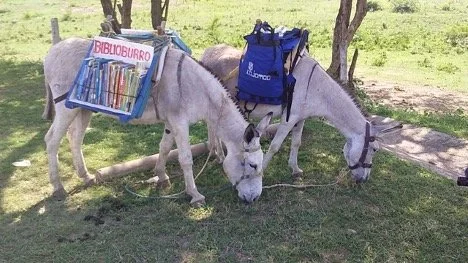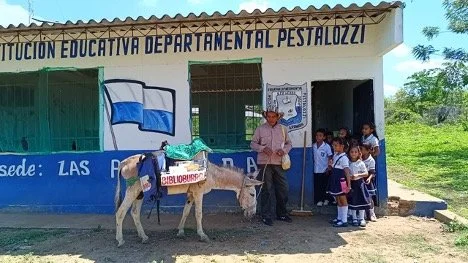biblioburro
A typical day with the donkey is very long, starting at four in the morning and ending at five in the afternoon. Our daily route is equivalent to between 11 and 15 kilometers, the shortest being around eight hours. The donkey crosses plains, undulating terrain and desert parts with an extremely hot climate, with temperatures up to 40°C.
-Luis Soriano, who spearheads a most unique literacy-based initiative in Latin America.
Phonetic Planet is thrilled to introduce you to Biblioburro!
Thank you so much for your willingness to participate in this conversation! Our readers will be very interested to know a little about the part of the world in which you are situated so feel free to begin by painting a descriptive scene of the special place you call home for us.
Hello! My name is Luis Soriano and I live in Latin America, in a country called Colombia. By the way, it is the entrance to Latin America, where the climate is very dry. In our country there are hot and cold climates. I am currently in a place where the climate is very hot, with a thermal sensation that reaches 40° in the shade. In addition, there are many butterflies here, birds of various colors and songs, as well as large and small animals, and many insects. Colombia is a dream country and place! We have a mountain range, the Sierra Nevada de Santa Marta, where the highest snow-capped peak called Simón Bolívar and the medium peak called Cristóbal Colón are located. In addition, we have a plain of almost 5000 km² where our main river is the Magdalena, of Macondian origin, where great dreams and fantasies grow and become reality. In Magdalena we also have a traveling library for 26 years, with two donkeys named Alfa and Beto, who travel along paths where it is very difficult for children to reach populated centers.
Luis, can you tell us why the Biblioburro project began? For example, are there other libraries in the area? Does every child have access to school? Was there a special story behind the beginnings of this unique project?
I can tell you that this Biblioburro project began many years ago, approximately 27 years ago, with the purpose of helping children who live far from populated centers, those who have difficulties accessing technology and research processes through the books. The Biblioburro program reaches these children in places where there are no nearby libraries, as I mentioned before, they are places that are difficult to access. There were times when children did not have schools when the project began, and with our help, mayors and authorities built schools and appointed teachers to help guarantee children's right to education. I also have an incredible story to tell you. At least some children who learned with the Biblioburro taught others who stayed at home. Today I can tell you that a teacher and a graduated child who is in college have left the program. There are many diverse stories to share in this process. I couldn't tell you that I have a special story, it would be selfish on my part, since I have many anecdotes to tell about the process of animating and promoting reading in Biblioburro.
What is a typical day in the life of a librarian who travels this way? You could describe the type of terrain traveled, how many miles are walked, how many children are served?
A typical day with the donkey is very long, starting at four in the morning and ending at five in the afternoon. Our daily route is equivalent to between 11 and 15 kilometers, the shortest being around eight hours. The donkey crosses plains, undulating terrain and desert parts with an extremely hot climate, with temperatures up to 40°C. On the roads we travel along in the afternoons, we enjoy impressive sunsets with rainbows of all colors and dreamlike sunsets. This motivates us to get up the next day or on the same day we begin our journey. At the end of the day, we feel satisfied to have served about 50, 60 or even 100 children who live far from population centers. We also serve adults, lending them books, telling them stories and giving them a different experience in the place where we arrive with our donkeys, Alfa and Beto.
With this process, we help these children with their schoolwork, we become friends of the teachers and pedagogical tools for them. To carry out this work, we need the help and support of many people who collaborate so that the children we serve acquire knowledge. Nowadays, the task is easier thanks to the use of new technologies, which allow us to reach places where we are needed with just a phone call. Twenty-six years ago it was much more difficult, since we didn't know if we would find someone to take care of us or pay attention to us. Nowadays, the population has grown and thanks to cell phones all communication processes have been improved. On days without rain, the donkey travels long distances; However, rain becomes our natural enemy and prevents us from going out on rainy days, having to postpone many activities. When the rainy season arrives, the donkey is ready to help children who live far from populated centers. Basically we visit house to house and collaborate with schools as educational tools for teachers.
Luis, can you please tell us a little about the donkeys?
We have two donkeys; one is called Alfa and the other is called Beto. When put together, they form the word "alphabet." We started with a donkey that had no name, but then I decided to get a donkey to be with the donkey. The children of the region participated in a contest to name him, and finally a child from a very rural school on the side of the Palace came up with the idea of giving them the names Alfa and Beto. With them we carry children's literature books, reference books, dictionaries, geography books, books for adults and children. The child population, which is much larger than the adult population, is the one that uses these books the most.
What kind of books are carried in this special library? Can you list some of them by name? I’m also curious to know whether these books are donated or purchased?
We have a large number of children's literature books, including 'The Thousand and One Nights', Rafael Pombo's stories such as 'The Walking Tadpole' and 'The Poor Old Lady', as well as stories such as 'Painted Tales' and anthologies such as 'Matchboxes'. We also have universal literature books, dictionaries and geography books in Spanish that help the education of children in the rural sector. What we do with these books is lend them for a month or 15 days, and if they return within a maximum period of 60 days, we lend them again. These books are donated by many Colombians and children from other parts of the world, who send us books and funds to buy more books here. It is often easier for us when they send us money because we can then buy the books here without having to pay taxes for shipping.
Do you have a website or a presence on social media?
Regarding social networks, I want to tell you that, due to the lack of knowledge or access to Internet services in our area, we were victims of hacking and account theft by people who posed as Professor Soriano and used the name in the process. These accounts were reported at the time. We are currently being very rigorous in the account creation process, we are undergoing reorganization and we are only present on Instagram, which is our official page. We have no presence anywhere else, any other account is fake. My daughter Susana Soriano is in charge of managing this Instagram account. Once everything is ready, we will inform everyone about the process and the blog we are creating about Biblioburro and the reorganization of our Foundation and our information processes worldwide. For now, we are only active on Instagram. For any questions, you can also write to Luis Soriano at eldoctosoriano@hotmail.com. I am very interested in getting in touch and talking to you. We are a little limited in terms of technological devices to carry out all this, but we trust in God and in some good-hearted people who can donate us some computers or phones with good memory to be able to do the work that we deserve from the Biblioburro process, which will also have a page called Biblioburro Digital and which we are updating.
It’s been such a pleasure to have this conversation with Luis Soriano and we are grateful to him, and also to his daughter Susana, for introducing us to the life of a traveling librarian in the Colombian countryside. You can find Luis on Instagram here: @biblioburro_oficial
We wish him continued success with this wonderful initiative. It certainly makes a huge difference in the lives of the many children it serves.
All photos in this article were used by kind permission of the Biblioburro team.





